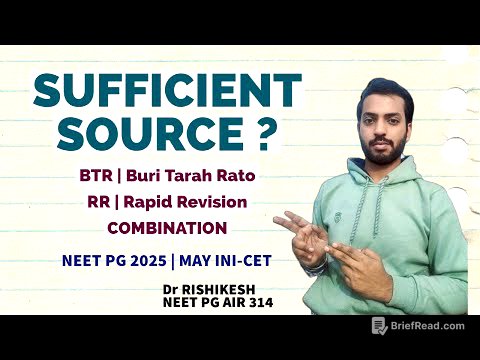TLDR;
This video explains Article 19 of the Indian Constitution, which deals with the Right to Freedom. It covers six fundamental freedoms: freedom of speech and expression, freedom of assembly, freedom of association, freedom of movement, freedom of residence, and freedom of profession. The video also discusses the reasonable restrictions that can be imposed on these freedoms.
- Article 19 protects these freedoms against the state, but not against private individuals.
- The Supreme Court has ruled that these freedoms are also available against private individuals.
- These freedoms are available only to Indian citizens, not to foreigners.
Right to Freedom: Article 19 Explained [0:00]
This video starts with an overview of Article 19, which guarantees six fundamental freedoms to Indian citizens. These freedoms include freedom of speech and expression, freedom of assembly, freedom of association, freedom of movement, freedom of residence, and freedom of profession. The video explains that these freedoms are protected against the state, but not against private individuals. However, the Supreme Court has ruled that these freedoms are also available against private individuals. The video also clarifies that these freedoms are not available to foreigners.
Freedom of Speech and Expression: Article 19(1)(a) [5:12]
Article 19(1)(a) guarantees the freedom of speech and expression to every Indian citizen. This freedom includes the right to express one's views, opinions, and beliefs through various means like writing, printing, picturing, or any other manner. The Supreme Court has expanded the scope of this freedom to include freedom of the press, freedom of commercial advertisement, and the right to telecast. The video also highlights the right to know about government activities and the right to silence. However, this freedom is subject to eight reasonable restrictions, including those related to the sovereignty and integrity of India, security of the state, decency and morality, contempt of court, defamation, and incitement to an offense.
Freedom of Assembly: Article 19(1)(b) [7:02]
Article 19(1)(b) guarantees the freedom of assembly to every Indian citizen. This freedom allows citizens to assemble peacefully and without arms. This freedom can be exercised only on public land and does not extend to private property. The video explains that the assembly must be peaceful and unarmed, and any violent or armed assembly that breaches public peace is not considered under this freedom. The state can impose reasonable restrictions on this freedom based on the sovereignty and integrity of India and public order. The video also discusses Section 144 of the Criminal Procedure Code, which allows a magistrate to restrain assemblies in situations where there is a threat to human life, health, safety, or public peace.
Freedom of Association: Article 19(1)(c) [9:20]
Article 19(1)(c) guarantees the freedom of association to every Indian citizen. This freedom allows citizens to form associations, political parties, partnerships, societies, clubs, and organizations. It also includes the right to not join any association or union. The video explains that this freedom is subject to reasonable restrictions based on the sovereignty and integrity of India, public order, and morality. The video also clarifies that the right to obtain recognition of an association is not a fundamental right. The Supreme Court has ruled that trade unions do not have a guaranteed right to effective bargaining, the right to strike, or the right to declare a lockout.
Freedom of Movement: Article 19(1)(d) [10:57]
Article 19(1)(d) guarantees the freedom of movement to every Indian citizen. This freedom allows citizens to move freely throughout the territory of India, including from one state to another. The video explains that this freedom is subject to two reasonable restrictions: in the interest of the general public and for the protection of the interests of Scheduled Tribes. The video also discusses the Supreme Court's ruling that the freedom of movement of prostitutes can be restricted on the grounds of public health and public morals.
Freedom of Residence: Article 19(1)(e) [13:13]
Article 19(1)(e) guarantees the freedom of residence to every Indian citizen. This freedom allows citizens to reside and settle anywhere in India. The video explains that this freedom is subject to two reasonable restrictions: in the interest of the general public and for the protection of the interests of Scheduled Tribes. The video also discusses the Supreme Court's ruling that certain individuals, like prostitutes, can be restricted from settling or residing in particular areas.
Freedom of Profession: Article 19(1)(g) [15:03]
Article 19(1)(g) guarantees the freedom of profession to every Indian citizen. This freedom allows citizens to practice any profession, occupation, trade, or business. The video explains that this freedom is subject to reasonable restrictions based on the general public interest, professional and technical qualifications, and the state's right to maintain a monopoly in certain industries. The video also discusses the Supreme Court's ruling that the freedom to practice a profession over the internet is also protected under Article 19(1)(g). The video concludes by emphasizing that the right to property, which was previously a fundamental right under Article 19(1)(f) and Article 31, was abolished by the 44th Constitutional Amendment in 1978. This right is now a legal right under Article 300A.









